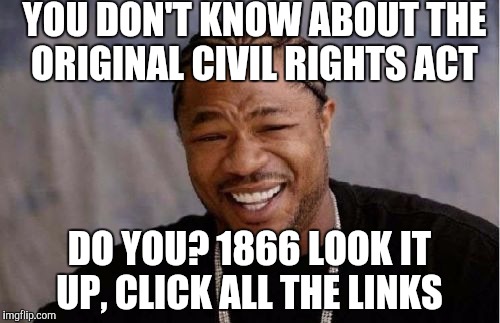
When it comes to racial discrimination cases, the Civil Rights Cases (1883) said the 14th Amendment only applies to state actors and private businesses can discriminate against African Americans.
To start, here’s the facts of the Civil Rights cases. In a series of five separate cases, African Americans weren’t allowed access to theaters, cabs, cars, and inns based on their skin color. Further, African Americans argued a federal law in 1875 gave all people in the United States the right of equal treatment. Initially, these African Americans prevailed under the Act in lower court; however, the defendants appealed to the Supreme Court arguing this Act was an unconstitutional use of Congressional power as outlined in the Thirteenth and Fourteenth amendments.
This case presented the following issue to the Supreme Court: Did the Civil Rights Act of 1875 violate the 10th Amendment of the Constitution?
The Supreme Court held the following: When it comes to private discrimination against African Americans, the Thirteenth and Fourteenth Amendments only apply to state actors; therefore, private discrimination falls outside the scope of these amendments. Furthermore, under the 10th Amendment, private acts of discrimination must be legislated by the states and cannot be legislated by the federal government.
Notably, this was a criminal case. In these cases, private business owners could of went to jail. Basically, if you didn’t admit someone to the movie theater or your business, you risked jail time. The 1800s had strong anti-discrimination laws.
Originally, the Civil Rights Act of 1866 applied to government. The government could not discriminate. Later, this act was expanded.
As time passed, the Civil Rights act of 1875 was amended to include private businesses. However, the Act was not followed. The Civil Rights cases headed to court.
As with all things, the eradication of discrimination took time. In the past, anti-discrimination laws were premised on amendments; however, anti-discrimination laws would need to be based on the Commerce Clause. After the 1950s, discrimination cases looked to the the Commerce Clause to end discrimination in private businesses.
Ironically, the Supreme Court wasn’t the entity to end discrimination. In fact, the Supreme Court followed legal precedents which upheld racial discrimination. That being said, it would be President Lyndon Byron Johnson (LBJ) along with Congress to pass the Civil Rights Act of 1964. This Act ended discrimination in public places.
Overall, the Supreme Court read the 14th Amendment narrowly in this case. They said the 14th Amendment only applies to state actors and not private businesses; therefore, private businesses were allowed to discriminate against African Americans. However, in time, the 14th Amendment would be read broadly by a different composition of the Supreme Court.